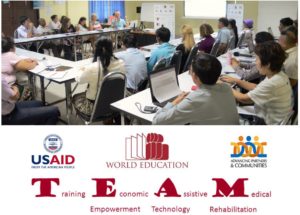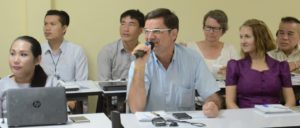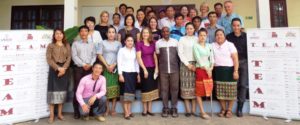On 27 April 2017, the USAID-funded World Education Laos (WEL) TEAM project organized the seventh coordination meeting with 36 participants, including USAID, WEL, and TEAM’s 14 current sub-recipients. The meeting took place at the Learning House for Development in Vientiane.
WEL’s TEAM project and its sub-recipients shared their latest achievements and progress; emphasis was placed on learning from one another, and developing synergies with each other, in order to develop the rehabilitation and disability sectors in Laos. In addition, the importance of outcome measurement and accountability to demonstrate tangible change in the lives of beneficiaries was highlighted. As WEL-TEAM project’s Technical Director Bernard Franck stated, “It is so important that an organization can demonstrate its capacity to change the lives of people.”
Two of WEL-TEAM’s sub-recipients, QLA and CRS, joined together to distribute assistive devices in Khammouane Province for QLA to learn from CRS’s experience of assistive devices provision and monitoring. QLA was able to observe both the achievements and challenges of the distribution process and reflect on how they can improve their own practice in Xieng Khouang. For the future, it was agreed that the procurement and distribution of assistive devices must immediately follow the medical screening process, and that appropriate assistive devices must be given to the appropriate users.
LDPA als o teamed up with LDWDC to deliver a job readiness training to LDWDC’s third batch of female trainees. The training truly empowered women with disabilities to reflect on their strengths and weaknesses and gave them the confidence to find a job in the future. Looking towards the future of the rehabilitation and disability sector in Laos, participants of TEAM’s Seventh Coordination Meeting discussed the importance of policy makers in implementing sustainable development changes. Upon hearing a presentation from the Faculty of Medical Technology on short-term rehabilitation training for medical doctors for one month, Michael Schultze from the Association for Autism asked, “What are the means to solve the core of the problem [a lack of internationally qualified rehabilitation personnel in Laos]? This is a short-term training; none of these doctors will be able to diagnose autism [as that was not part of the rehabilitation training]. There should be a longer term vision to send people to study abroad. We are doing the best we can do to solve immediate needs, but what about long term ones?”
o teamed up with LDWDC to deliver a job readiness training to LDWDC’s third batch of female trainees. The training truly empowered women with disabilities to reflect on their strengths and weaknesses and gave them the confidence to find a job in the future. Looking towards the future of the rehabilitation and disability sector in Laos, participants of TEAM’s Seventh Coordination Meeting discussed the importance of policy makers in implementing sustainable development changes. Upon hearing a presentation from the Faculty of Medical Technology on short-term rehabilitation training for medical doctors for one month, Michael Schultze from the Association for Autism asked, “What are the means to solve the core of the problem [a lack of internationally qualified rehabilitation personnel in Laos]? This is a short-term training; none of these doctors will be able to diagnose autism [as that was not part of the rehabilitation training]. There should be a longer term vision to send people to study abroad. We are doing the best we can do to solve immediate needs, but what about long term ones?”
 Bernard Franck stated that the World Education TEAM model was the solution – by working together with government, local organizations, and international organizations and donors, the rehabilitation sector can fully develop to meet the unmet needs of persons with disabilities. In February 2017 at the World Health Organization’s “Rehabilitation 2030: A Call for Action’” conference on the future of rehabilitation, attended by the Lao PDR Vice-Minister for Health and TEAM’s Technical Director, all countries committed to take ten actions to reach the total integration of rehabilitation into the health system by 2030.
Bernard Franck stated that the World Education TEAM model was the solution – by working together with government, local organizations, and international organizations and donors, the rehabilitation sector can fully develop to meet the unmet needs of persons with disabilities. In February 2017 at the World Health Organization’s “Rehabilitation 2030: A Call for Action’” conference on the future of rehabilitation, attended by the Lao PDR Vice-Minister for Health and TEAM’s Technical Director, all countries committed to take ten actions to reach the total integration of rehabilitation into the health system by 2030.
TEAM demonstrates that, through cooperation and coordination, a country and the lives of its people can change for the better!
